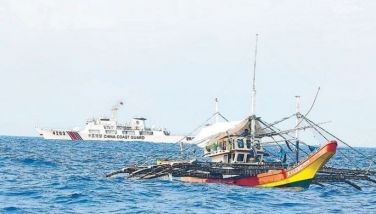Palace: Pass anti-terror law so there’s less need for AFP operations
August 7, 2006 | 12:00am
An anti-terrorism law would nip terror threats in the bud and allow the government to rely less on massive military operations to neutralize suspected terror groups in the country, Malacañang said yesterday.
"Once more, we call on Congress to speed up the passage of the Anti-Terror Bill to further neutralize the movement of terrorist arms, funds and personnel across communities and borders, and to nip the threat in the bud without need for massive military operations," Press Secretary Ignacio Bunye said.
Bunye pointed out the ongoing military offensives in Sulu against Abu Sayyaf chieftain Khadaffi Janjalani and key Jemaah Islamiyah (JI) militants Dulmatin and Umar Patek, who are both wanted for the bloody Bali resort attacks in 2002, is part of the government’s strategic campaign to support the global fight against terrorism "and to serve our own political and economic security" interests.
But without any comprehensive law dealing on terror, the government is forced to resort to massive military operations in containing terrorism, Bunye stressed.
"The government has scored success after success in the campaign against terrorism and we shall continue to use the hand of steel in flushing out the network of evil," he said.
Bunye added President Arroyo commended the Armed Forces "for gaining ground and pushing ahead in its offensive against terror" in Sulu where government troops are in hot pursuit of Janjalani and two JI militants.
Executive Secretary Eduardo Ermita, chairman of Malacañang’s Anti-Terrorism Task Force (ATTF), said Armed Forces chief Gen. Hermogenes Esperon and Marine commandant Maj. Gen. Nelson Allaga made separate assurances that the troops had formed a ring of steel to prevent Janjalani and his henchmen "from escaping the theater of operations."
"We are aiming to neutralize them for good," Ermita averred.
The military said Janjalani and his henchmen may have slipped out the offensive but the troops had them surrounded in the dense jungles of Indanan, Sulu.
"The troops are still there. The personalities we are running after are moving around in the jungle," said Col. Mohammad Nur Askalani, Southern Command chief of staff and designated spokesman.
Askalani said there has been no skirmishes as of press time as the Abu Sayyaf bandits are trying to evade a direct confrontation with the troops.
Over a hundred bandits reportedly broke into small groups to divide the attention of their pursuers, the military said.
"The troops remained in the area and we are not letting it go," Askalani said.
He said the military still managed to contain the Abu Sayyaf bandits in Indanan who are trying to cross into known Moro National Liberation Front (MNLF) camps.
The military said the recent cooperation and concern displayed by MNLF to help out in the manhunt prevented the Abu Sayyaf from taking refuge in the camps of the former guerrilla forces.
Anti-terror Task Force Comet chief Brig. Gen. Alexander Aleo said the discovery of the Abu Sayyaf and JI bomb-making facility in Barangay Kagay had prevented future bombing attacks.
The troops on Thursday overran the terrorist camp following intense ground encounters which left nine Abu Sayyaf bandits killed and three others wounded.
As the offensive heated up since last week, Malacañang assured the US, Indonesia and Australia that the three high-profile fugitives will not escape the military dragnet.
Dulmatin, who carries a $10-million bounty on his head, is a senior JI figure known as an electronics and explosives expert.
Umar Patek, who has a $1-million bounty on his head, is said to have served as the assistant for the coordinator of the Bali bombings.
The US is offering $5 million for the capture of Janjalani, included in the US Federal Bureau of Investigation’s list of most wanted terrorists for kidnapping and killing US citizens.
In the absence of any legislation against terrorism, security officials stressed the Philippines remains one of the weakest links in the regional fight against the global menace.
ATTF executive director Ricardo Blancaflor explained an anti-terrorism law would allow the government to immediately detain terror suspects for a longer period.
Proposals include giving the authorities greater leeway in gathering the evidence against the suspects.
"In the case of the ongoing Sulu operation, if we were able to monitor their entry in country or their telephone conversations, then we would have immediately arrested them," Blancaflor said.
"If they were arrested earlier, then they would (not) have grown in numbers and create some bases," he said.
Blancaflor said a mere recorded telephone conversation of suspected terrorists plotting to stage attacks should be enough basis for an arrest.
He pointed out the country’s penal laws have yet to recognize terrorism as a threat to peace and security.
Blancaflor pointed out those responsible behind the bombing of a ferry in 2004 and the Valentine’s Day simultaneous bombings in Makati, Davao and General Santos City have been arrested years before the attacks occurred but were allowed to post bail.
Allowing the suspects to post bail gave them the opportunity to launch another attack, he said. — With Roel Pareño
"Once more, we call on Congress to speed up the passage of the Anti-Terror Bill to further neutralize the movement of terrorist arms, funds and personnel across communities and borders, and to nip the threat in the bud without need for massive military operations," Press Secretary Ignacio Bunye said.
Bunye pointed out the ongoing military offensives in Sulu against Abu Sayyaf chieftain Khadaffi Janjalani and key Jemaah Islamiyah (JI) militants Dulmatin and Umar Patek, who are both wanted for the bloody Bali resort attacks in 2002, is part of the government’s strategic campaign to support the global fight against terrorism "and to serve our own political and economic security" interests.
But without any comprehensive law dealing on terror, the government is forced to resort to massive military operations in containing terrorism, Bunye stressed.
"The government has scored success after success in the campaign against terrorism and we shall continue to use the hand of steel in flushing out the network of evil," he said.
Bunye added President Arroyo commended the Armed Forces "for gaining ground and pushing ahead in its offensive against terror" in Sulu where government troops are in hot pursuit of Janjalani and two JI militants.
Executive Secretary Eduardo Ermita, chairman of Malacañang’s Anti-Terrorism Task Force (ATTF), said Armed Forces chief Gen. Hermogenes Esperon and Marine commandant Maj. Gen. Nelson Allaga made separate assurances that the troops had formed a ring of steel to prevent Janjalani and his henchmen "from escaping the theater of operations."
"We are aiming to neutralize them for good," Ermita averred.
The military said Janjalani and his henchmen may have slipped out the offensive but the troops had them surrounded in the dense jungles of Indanan, Sulu.
"The troops are still there. The personalities we are running after are moving around in the jungle," said Col. Mohammad Nur Askalani, Southern Command chief of staff and designated spokesman.
Askalani said there has been no skirmishes as of press time as the Abu Sayyaf bandits are trying to evade a direct confrontation with the troops.
Over a hundred bandits reportedly broke into small groups to divide the attention of their pursuers, the military said.
"The troops remained in the area and we are not letting it go," Askalani said.
He said the military still managed to contain the Abu Sayyaf bandits in Indanan who are trying to cross into known Moro National Liberation Front (MNLF) camps.
The military said the recent cooperation and concern displayed by MNLF to help out in the manhunt prevented the Abu Sayyaf from taking refuge in the camps of the former guerrilla forces.
Anti-terror Task Force Comet chief Brig. Gen. Alexander Aleo said the discovery of the Abu Sayyaf and JI bomb-making facility in Barangay Kagay had prevented future bombing attacks.
The troops on Thursday overran the terrorist camp following intense ground encounters which left nine Abu Sayyaf bandits killed and three others wounded.
Dulmatin, who carries a $10-million bounty on his head, is a senior JI figure known as an electronics and explosives expert.
Umar Patek, who has a $1-million bounty on his head, is said to have served as the assistant for the coordinator of the Bali bombings.
The US is offering $5 million for the capture of Janjalani, included in the US Federal Bureau of Investigation’s list of most wanted terrorists for kidnapping and killing US citizens.
In the absence of any legislation against terrorism, security officials stressed the Philippines remains one of the weakest links in the regional fight against the global menace.
ATTF executive director Ricardo Blancaflor explained an anti-terrorism law would allow the government to immediately detain terror suspects for a longer period.
Proposals include giving the authorities greater leeway in gathering the evidence against the suspects.
"In the case of the ongoing Sulu operation, if we were able to monitor their entry in country or their telephone conversations, then we would have immediately arrested them," Blancaflor said.
"If they were arrested earlier, then they would (not) have grown in numbers and create some bases," he said.
Blancaflor said a mere recorded telephone conversation of suspected terrorists plotting to stage attacks should be enough basis for an arrest.
He pointed out the country’s penal laws have yet to recognize terrorism as a threat to peace and security.
Blancaflor pointed out those responsible behind the bombing of a ferry in 2004 and the Valentine’s Day simultaneous bombings in Makati, Davao and General Santos City have been arrested years before the attacks occurred but were allowed to post bail.
Allowing the suspects to post bail gave them the opportunity to launch another attack, he said. — With Roel Pareño
BrandSpace Articles
<
>
- Latest
- Trending
Trending
Latest
Trending
Latest
Recommended






























